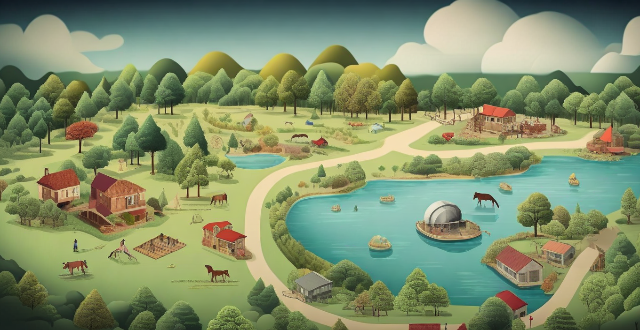Ecological protection areas and traditional knowledge and practices are interconnected, with the latter serving as a vital resource for conservation efforts. These areas often contain valuable traditional knowledge developed by indigenous communities, which can aid in their effective management. Traditional knowledge encompasses agricultural practices, medicinal plants, sustainable hunting and fishing techniques, and land management methods. Ecological protection areas aim to preserve biodiversity and ecosystem services through legal means like national parks and nature reserves. The intersection of these two realms offers benefits for both conservation and cultural preservation, encourages community engagement, and creates economic opportunities through ecotourism. Integrating traditional knowledge into conservation strategies can lead to more effective and culturally sensitive management of ecological protection areas while preserving the cultural heritage of indigenous peoples.

The Relationship between Ecological Protection Areas and Traditional Knowledge and Practices
Ecological protection areas and traditional knowledge and practices are closely intertwined. These areas often serve as repositories of traditional knowledge and practices, which have been developed over centuries by indigenous communities living in close proximity to nature. In turn, these traditional knowledge and practices can contribute to the effective management and conservation of ecological protection areas.
Traditional Knowledge and Practices
Traditional knowledge and practices refer to the cumulative body of knowledge and practices that indigenous communities have developed over generations in response to their local environments. This includes:
- Agricultural practices: such as crop rotation, intercropping, and the use of natural fertilizers.
- Medicinal plants: indigenous communities often have extensive knowledge of local plants and their medicinal properties.
- Hunting and fishing practices: many communities have developed sustainable hunting and fishing practices that ensure the long-term survival of wildlife populations.
- Land management practices: such as controlled burning to prevent wildfires and maintain ecosystem health.
Ecological Protection Areas
Ecological protection areas are designated regions where biodiversity is protected through legal or other effective means. These areas include national parks, nature reserves, and other protected areas. They serve as important habitats for threatened species and play a crucial role in maintaining ecosystem services that support human well-being.
The Intersection of Traditional Knowledge and Ecological Protection Areas
The intersection of traditional knowledge and ecological protection areas is multifaceted:
Conservation Benefits
- Biodiversity conservation: Traditional knowledge can inform conservation efforts by providing insights into the ecological requirements of species and the functioning of ecosystems.
- Sustainable use: Traditional practices often promote the sustainable use of resources, which aligns with the goals of ecological protection areas.
Cultural Preservation
- Cultural heritage: Ecological protection areas can help preserve the cultural heritage of indigenous communities by protecting the natural resources that are integral to their traditions and livelihoods.
- Recognition and respect: Acknowledging the value of traditional knowledge in ecological protection can foster greater recognition and respect for indigenous cultures.
Community Engagement
- Co-management: Collaborative approaches that involve both park managers and local communities can lead to more effective conservation outcomes.
- Education and awareness: Ecological protection areas can serve as living classrooms where traditional knowledge is passed on to future generations.
Economic Opportunities
- Ecotourism: By incorporating traditional knowledge into ecotourism experiences, ecological protection areas can offer unique opportunities for visitors while providing economic benefits to local communities.
Conclusion
The relationship between ecological protection areas and traditional knowledge and practices is one of mutual benefit. By integrating traditional knowledge into conservation strategies, we can achieve more effective and culturally sensitive management of these critical ecosystems. Moreover, recognizing and supporting these traditions helps to preserve not only biodiversity but also the rich cultural heritage of indigenous peoples.